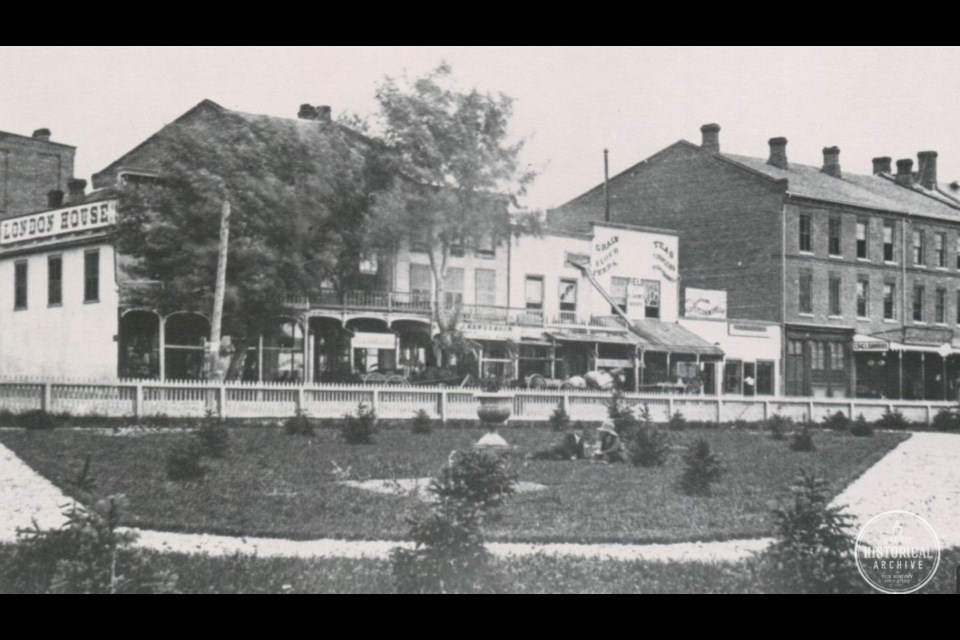It is safe to say that not many bars or restaurants have a jail cell in their establishment, although one might come in handy on a particularly rowdy Saturday night.
A few years ago, I brought a walking tour along Dunlop Street East to take in the beauty of some our finer Victorian business buildings. Our group stopped at the newly opened Homestead Bakery, 80 Dunlop Street East, in the old Bothwell Block, to take a peek at the mosaic floor tiles and tin ceiling that had been recently uncovered by renovations.
Our small crowd attracted the attention of the staff working at McReilly’s Public House next door. McReilly’s too had been undergoing a renovation and had discovered a puzzling feature after removing some walls near the bar area.
This oddity likely dates back 1875, or just after, as this was the year that one of the busiest men in Simcoe County was elected Sheriff. Thomas David McConkey was the owner of the building which today houses McReilly’s, and it would have been he who had the jail cell installed there.
The McConkey building is large and is home to several businesses and to 2 floors of apartments at 82 - 88 Dunlop Street East. It is also the oldest structure in the block. Built with fire walls, an expensive rarity at the time, this 1866 building prevented fires from spreading beyond it on more than one occasion.
Business man, reeve, warden, and member of parliament, McConkey took on the role of County Sheriff when he was 60 years old and held the position until his death 15 years later.
In many cases, nineteenth century lawmen of every type were volunteers or paid on a fee basis. By necessity, most were employed in other sorts of paying work or, like McConkey, were businessmen with some government experience.
McConkey’s predecessor, Benjamin Smith, had been County Sheriff since the county was first formed in 1842 and had continued in that role until his death in early 1875, a term of 33 years.
Barrie was sharply divided along political lines in those days, and some would argue that not much has changed. Mr. McConkey’s political opponents were naturally unhappy with his appointment.
This paragraph from the Northern Advance of October 7, 1875, penned by Mr. McConkey’s opponents, paints an interesting word picture of the state of Sheriff Smith’s office, one that the incoming Sheriff wished to have renovated.
“There was such a flood of tobacco smoke from the two usual occupants as to jar sensibly the olfactories and seriously threaten the eyes. The bare walls of whitewash since the builder had left it, untarnished by either paper or stain, save such as was casually made by ‘clean hands’ that were wont to congregate there. A rude counter, put together in a cheap manner, destitute of paint or putty, was the only ornament barring a chair or two, and a homemade spittoon compiled of sawdust and a cigar box foraged from the adjoining saloon.”
Apparently, Sheriff Smith’s humble office pointed to his virtue while McConkey’s desire to have a $200 renovation done was a sure sign of greed.
Our County Sheriff’s tasks were many and varied but largely consisted of the collection of debts, enforcing court orders, transferring prisoners, attending the opening of County Court sessions, overseeing elections and, beginning in 1873, escorting condemned prisoners to the gallows.
County constables, often poorly trained and barely paid, did the bulk of the law enforcement work. It was they who chased down the most dangerous outlaws but, if someone jumped bail, it was the Sheriff, or rather his deputies, who went after them.
On McConkey’s death in 1890, the popular opinion about town was that his successor should be Benjamin Smith Jr., the son of the first County Sheriff. This young man was a teen when he began working as a deputy for Sheriff McConkey. Smith was well seasoned by his duties which “took him to all parts of the county over bush trails and muddy roads.”
However, such an appointment was not in the cards. O.J. Phelps, a former member of the provincial legislature, was appointed. Deputy Smith served under him and under the next 3 County Sheriffs, Drury, Harvie and McLaren, and finally retired in 1933.
It seems to me that the County Sheriff had an interesting position but it would his deputies who could tell us the real stories of frontier law enforcement, as they were in the thick of it.
Each week, the Barrie Historical Archive provides BarrieToday readers with a glimpse of the city’s past. This unique column features photos and stories from years gone by and is sure to appeal to the historian in each of us.



